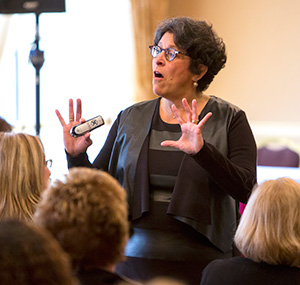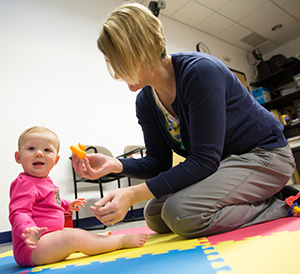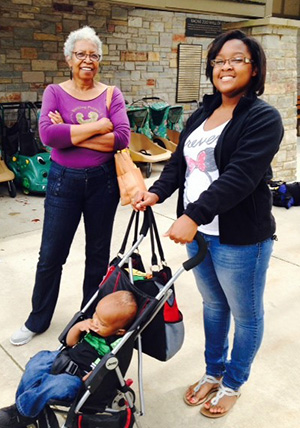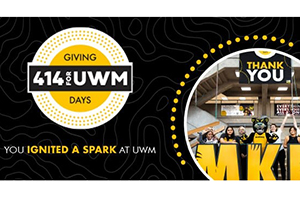Too many babies are born too small and die too soon in southeastern Wisconsin. African American babies still die at a rate three times than white babies, according to the Milwaukee Health Department and Fetal Infant Mortality Review.
UWM scholars, experts and researchers are working in partnership with many others locally and across the nation to reduce infant mortality rates and improve the quality of life across generations for families and their babies.
UWM takes a lead role in fight against infant death
Babies born in Milwaukee are more likely to die before reaching their first birthday than in most other U.S. cities and some developed countries, and the black-white gap is persistently wide.

That stark fact drives Magda Peck, founding dean of the Joseph J. Zilber School of Public Health to action. Peck’s research and practice focus on improving the health of women before, between and beyond pregnancy, and her leadership is making an impact nationally and locally. The founder and senior advisor to City MatCH, an organization of municipal health departments’ maternal and child health programs, and a longstanding member of the National Select Panel on Preconception Health, she helps shape national policy, clinical practice and programs that help women have healthier births. She also serves on the Milwaukee’s Life Course Initiative for Healthy Families steering committee with Milwaukee Mayor Tom Barrett.
“When women are at their healthiest prior to pregnancy, they are more likely to have healthy babies who survive and thrive the first year, and have healthier lives themselves,” Peck said.
Researchers look for prenatal roots of problems

UWM scientists also are searching for the causes of conditions that develop before birth. Epidemiologist Amy Kalkbrenner has added to a growing body of evidence published in top scientific journals linking autism to air pollution. Her colleague Michael Laiosa and his research team are investigating how mothers’ exposure to dioxin and related environmental contaminants impacts their children’s immune systems, and that of their grandchildren and even great-grandchildren. Kurt Svoboda’s Laboratory for Developmental Neurobiology uses zebrafish to study how a parent’s use of nicotine might impact a baby before birth.
Nursing students help create healthier day cares
Milwaukee County is the worst in Wisconsin for asthma-related hospitalizations and emergency department visits.
In one ZIP code in northwest Milwaukee, the rate of hospitalizations for asthma among children younger than 5 is nearly twice that of Milwaukee County. Children in that neighborhood also have high rates of asthma-related emergency department visits.
UWM’s College of Nursing is working with the Westlawn Partnership for a Healthier Environment, the Wisconsin Asthma Coalition and the Wisconsin Department of Health Services to reduce asthma risk in this area. Nursing students and a community health worker visit day cares serving children birth to age 5 to assess potential asthma triggers, such as certain cleaning products. They also provided education about asthma and its triggers to day care staff, who share what they learn with parents.
Physical therapist helps get infants moving

Physical therapist Victoria Moerchen, of the College of Health Sciences, has been working for years to help infants who have difficulties with motor skills. Now, she’s looking at the interaction between parents and children after noticing that when parents relax and interact playfully with their children, infants do more walking.
Moerchen, whose studies involve infants walking on a treadmill with the help of their parents, is working with colleagues in nursing and health sciences on two studies focused on making the experience more fun for babies and their parents and promoting positive interaction between the two.
“They are on the treadmill eight minutes a day; five days a week,” Moerchen says. “That’s an opportunity for interaction that should not be missed.”
UWM faculty work with community partners to improve care

UWM researchers aren’t just working in labs, they’re partnering with community organizations to improve the care children receive at home.
Community health specialist Emmanuel Ngui is part of the Fetal Infant Mortality Review, a project with the City of Milwaukee Health Department that reviews information on stillbirths and infant deaths and makes recommendations to address the causes.
Other partners, including the Center for Urban Population Health, carry out those recommendations. The center’s Healthy Next Babies Project, which works with African-American parents who have already had a baby who needed neonatal intensive care. The project, done in collaboration with Aurora Family Service, provides intensive support services when the mother and child go home, tries to involve fathers and other family members, and encourages mothers to improve their own health before their next pregnancy.
Teresa Johnson, a nursing researcher, works with the Professional Women’s Network for Service on the Racine-Kenosha Birthing Project, which recruits women to mentor mothers and soon-to-be mothers. Educational sessions on prenatal care, parenting skills, breast feeding and well-child care also are available. Some graduates of the program have gone on to serve as mentors themselves.







